My Critique Group is Awesome (or, “Why Critique Groups are Crucial for Success”)

I’ve been meeting with a critique group for a little over a year.
At first, I was petrified by the idea of making myself so vulnerable. What if they didn’t like me? What if they didn’t like my work? I knew I had to break out of my shell, that I had to start meeting other writers if I was ever going to improve my craft and get to a point where I could publish my work. But I was terrified of rejection, and a few months passed before I finally found the courage to join a group and put myself out there.
It was the best decision I ever made.
I met some amazing writers and I learned a lot, not just about my fiction but also about the industry. One of my projects, a middle grade fantasy whose first draft is now in the hands of an editor, suffered from serious flaws that would have rendered it unpublishable. In just a few months, my group identified most of these problems and was there for me when I needed help figuring out how to fix them.
We gather around a table once a week and share up to ten pages of our work.
A volunteer reads each story out loud so that the writer has an opportunity to experience his or her words in a different way. When the reading is done, we go around the circle to discuss what we thought the writer did well and what we thought the writer could improve.
They help me identify and eliminate inconsistencies and contradictions. They help me resolve difficult plot and character problems that I’m either too inexperienced or too frustrated to solve. They recognize what I do well, but are also blunt and honest, and are never afraid to (charitably) point out the numerous ways in which I fail.
Sometimes I agree with their assessments and sometimes I don’t; art is inherently subjective.
But I always take what they have to say seriously and value their feedback. Knowing how my group receives my work gives me a better idea of how my audience will receive my work when it’s published. If the majority have issues with what I’ve written, I know I need to go back and take a closer look.
They rein me in when I get carried away. They encourage me to be bold. We support each other, inspire each other, teach each other, help each other to grow.
As an author, I’ve learned more in the year I’ve been with them than in all the other years I’ve been writing on my own.
If you’re an artist of any stripe, I implore you to get together with others in your field. You’ll find support. You’ll find insight. Most importantly, you’ll make fantastic friends and you’ll become better, not just as an artist but as a human being.
Enter your email address and click "Submit" to subscribe and receive The Sign.
